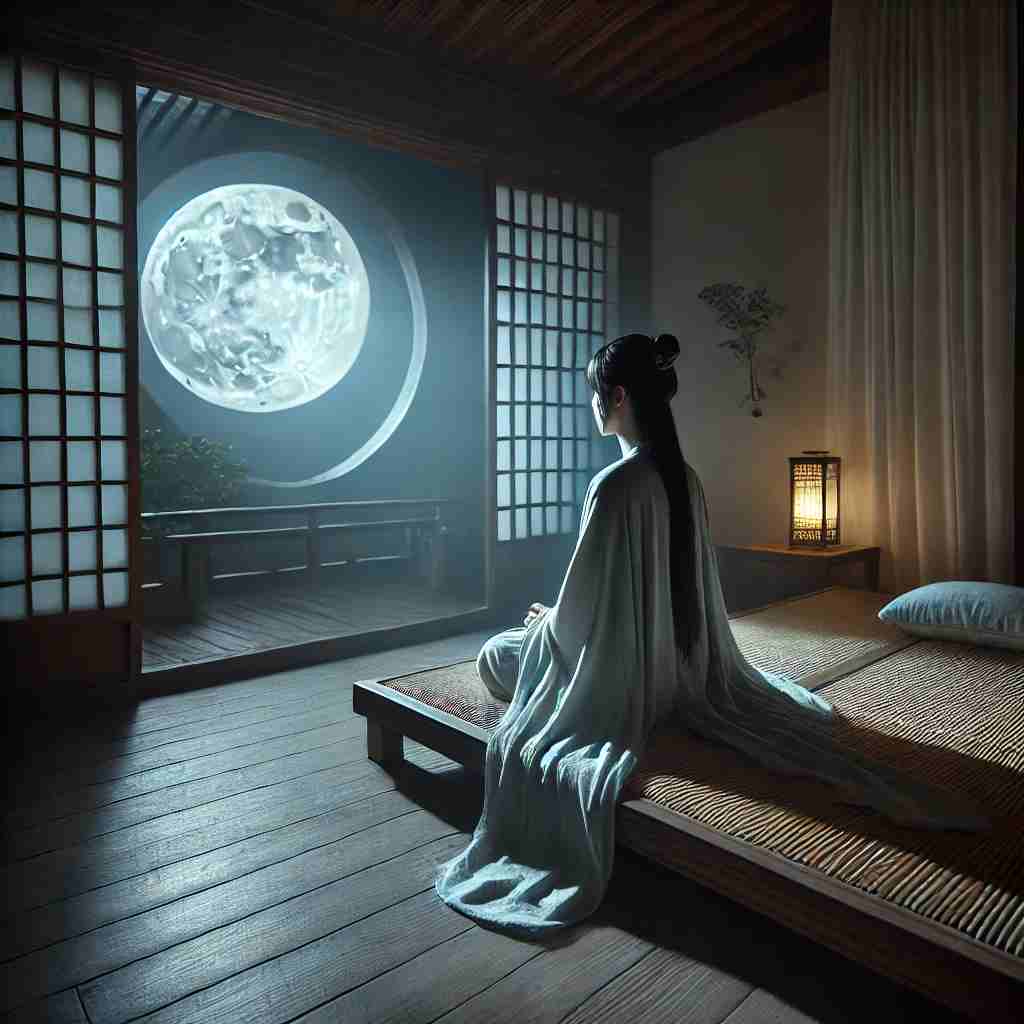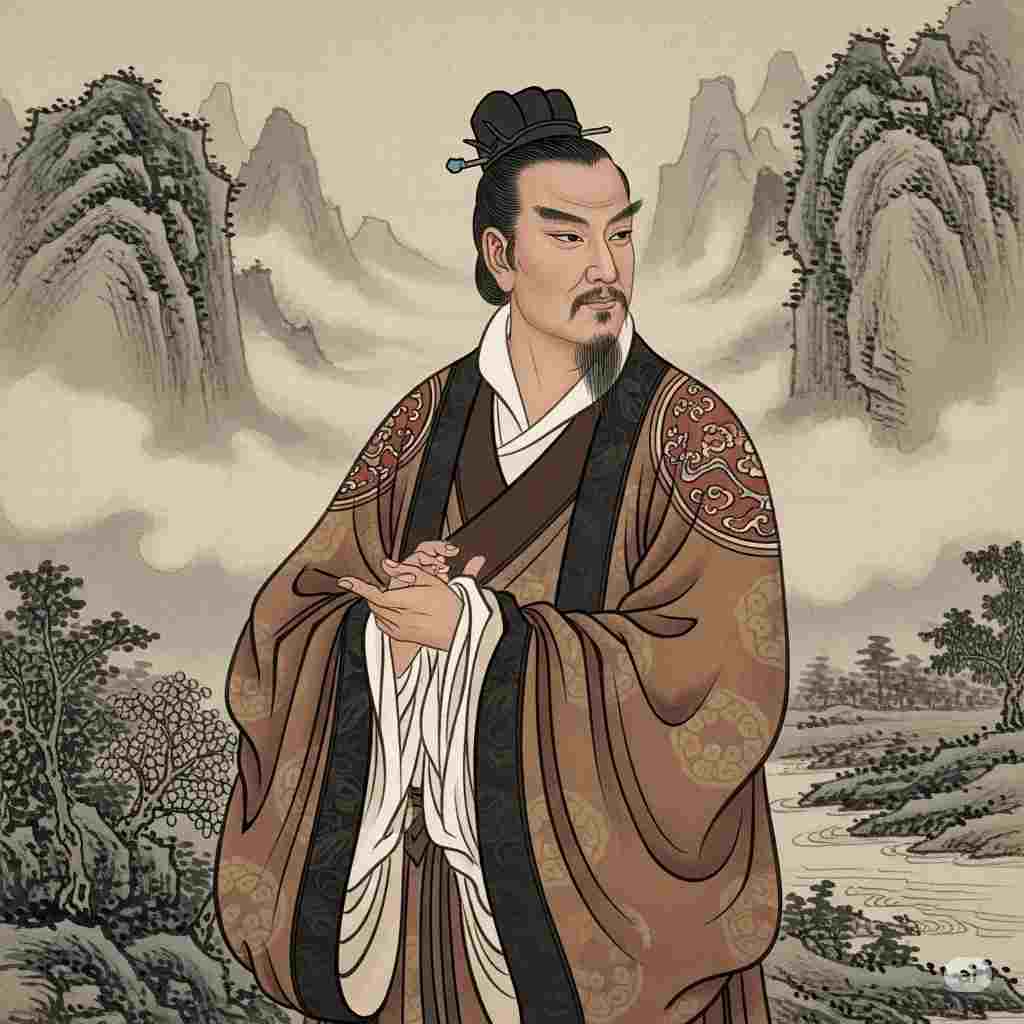Quiet Night Thoughts (Mandarin Chinese)
Li Bai
701 to 762

静夜思
床前明月光,
疑是地上霜。
举头望明月,
低头思故乡。
Li Bai's Quiet Night Thoughts
Li Bai's "Quiet Night Thoughts" (《静夜思》) is one of the most famous poems in Chinese literature, celebrated for its simplicity and depth. Written during the Tang Dynasty, a time marked by great cultural and artistic achievements, this poem reflects Li Bai’s characteristic themes of nostalgia, nature, and the transient beauty of life. In just four lines, Li Bai uses evocative imagery to express a deeply personal experience of homesickness and solitude.
Analysis
Line-by-Line Interpretation
-
“床前明月光” (Chuáng qián míng yuè guāng)
"In front of my bed, the bright moonlight"
The poem begins with a scene of calm simplicity. Li Bai describes moonlight illuminating the space before his bed, a familiar yet hauntingly beautiful image. This line sets a peaceful, meditative tone, drawing the reader into a quiet moment where the natural world—specifically the luminous, omnipresent moonlight—intersects with the poet's intimate indoor space. -
“疑是地上霜” (Yí shì dì shàng shuāng)
"Looks like frost on the ground"
Here, Li Bai’s observation deepens. The moonlight appears to him like frost, its white glow blanketing the ground with an icy illusion. This simile, which likens the moonlight to frost, reflects Li Bai's introspective state, as he misinterprets the natural light for something more tangible and cold. This small but powerful detail can be seen as a reflection of the chill he feels in his heart, perhaps intensified by his isolation. -
“举头望明月” (Jǔ tóu wàng míng yuè)
"I raise my head to gaze at the bright moon"
With a subtle shift in action, the poet raises his head, looking up to the moon itself. The upward motion here signals a brief moment of transcendence; he moves from his own earthly space to connect with the celestial. The moon, a classic symbol in Chinese poetry, often represents constancy and a connection to loved ones far away. For Li Bai, gazing at the moon bridges the distance between himself and his homeland, making it a medium for shared experience across space. -
“低头思故乡” (Dī tóu sī gù xiāng)
"Then lower it, thinking of my hometown"
After this brief communion with the moon, the poet lowers his gaze, overcome with longing for home. This downward motion represents a return to the self, burdened by a pang of nostalgia. In a few simple words, Li Bai captures the poignancy of homesickness, reminding the reader of the fundamental human desire for belonging and connection. The quiet motion of lowering one’s head encapsulates the silent weight of his thoughts, underscoring the poet's solitude in that moment.
Themes
1. Nostalgia and Homesickness
The central theme of the poem is nostalgia, or 思乡 (sī xiāng), a longing for one’s homeland. This is intensified by the moon’s presence, which serves as a symbol for reunion, often associated with shared experience despite physical separation. Li Bai’s use of nature—specifically the transformative effect of moonlight—emphasizes how the environment reflects and amplifies internal emotions, bridging the inner and outer worlds.
2. Nature and the Passage of Time
The imagery of moonlight, which Li Bai initially mistakes for frost, subtly evokes the passage of time and the changes brought by distance. Frost, a transient phenomenon, suggests the fleeting nature of time and perhaps the transience of human life and connection. The moon, on the other hand, is a constant presence, embodying the enduring pull of home and memory despite time and distance.
Form and Style
- "Quiet Night Thoughts" is written in a simple and direct language that belies its emotional depth. This quality is characteristic of classical Chinese poetry, where brevity and conciseness are used to evoke broad and often universal emotions.
- The poem follows the five-character quatrain structure (五言绝句, wǔ yán jué jù), a common form in Tang poetry that provides a strict framework within which poets must express profound ideas. The five-character line in Chinese poetry allows for condensed, rhythmic expressions, with each line imparting both literal and symbolic meaning.
- The juxtaposition of movement—raising and lowering the head—serves as a structural and symbolic arc in the poem, guiding the reader from observation to reflection. This movement mirrors the shifting states of awareness, linking the natural world with the poet’s inner state.
Conclusion
Li Bai's "Quiet Night Thoughts" encapsulates a deeply personal yet universally resonant experience. Through the tranquil image of moonlight, he captures the timeless human experience of feeling both connected to and separated from one’s origins. The simplicity of his language belies the poem’s profundity, as each line conveys layers of longing, beauty, and connection. This brief but powerful work is a testament to Li Bai’s mastery, his ability to evoke powerful emotions with minimal words, and his enduring influence on Chinese poetry and culture.
This text was generated by AI and is for reference only. Learn more
Want to join the discussion? Reopen or create a unique username to comment. No personal details required!



Comments
No comments yet. Be the first to comment!